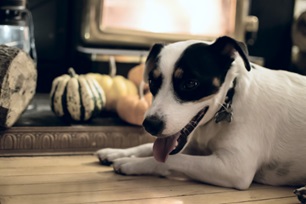Top safety tips to avoid a pet emergency this Thanksgiving
Turkey with all the fixings, cranberry sauce and pumpkin pie—we look forward to these delicious Thanksgiving dishes all year! With so many tasty treats to tempt our pets, it’s not surprising that our holiday feasts cause the majority of Thanksgiving-related pet emergencies.
The most common Thanksgiving dangers usually come in one of a few flavors:
- Toxic foods: Our culinary masterpieces can sometimes hide ingredients that are poisonous to pets, like chocolate, grapes, raisins, currents, onions, garlic, macadamia nuts and artificial sweeteners like xylitol.
- Fatty foods: Butter, meat drippings, gravies, dark turkey meat and other fatty foods can cause gastrointestinal upset (diarrhea and vomiting). Worse yet, fatty foods can cause inflammation of the pancreas, a condition known as pancreatitis, which may require hospitalization.
- Obstructive foods: Bones, corncobs and twine from trussing the turkey may get stuck in the digestive tract, potentially requiring surgical removal. Yeast dough is also problematic, not only expanding dangerously in the stomach, but the alcohol from fermenting yeast is rapidly absorbed into your pet’s bloodstream, resulting in alcohol poisoning, posing a double danger.
- Decorations: Floral arrangements may contain flowers that are toxic to pets. Each plant can pose a different danger for different species. Some lilies may range from non-toxic to dangerous for dogs, most varieties can be deadly for cats—even the vase water and pollen can result in severe, acute kidney failure. Candles can also result in burns or get accidentally knocked over.
Pets can get quite crafty trying to get to the mouthwatering fare, but a few precautions will keep their eager stomachs out of harm’s way:
- Keep all food and drink out of reach. Make sure there aren’t chairs or other furniture nearby that pets can jump up on to reach higher surfaces.
- Consider blocking off the kitchen when you’re not around to supervise. This is especially a good idea if your pet is a Houdini at finding ways to get at supposedly unreachable food.
- Secure all garbage cans so that they can’t be knocked over or their lids knocked off.
- Remind children and guests not to give your pet any food. Have fun, pet-friendly treats available instead.
- Make decoration choices with your pet’s safety in mind.
If you believe your pet has eaten something toxic, don’t panic. If possible, figure out what was eaten, then contact your veterinarian or the ASPCA Animal Poison Control Center at (1-888-426-4435) right away.
Have questions during Turkey Day? With Live Chat* through the myVCA app, our licensed veterinary professionals are always ready to answer your questions anytime, available day or night. >>
*Live Chat with a licensed veterinary professional is free for VCA clients through the myVCA mobile app, available at Apple’s App Store and Google Play.
